Harry Dean Stanton’s swansong: Lucky (2017)
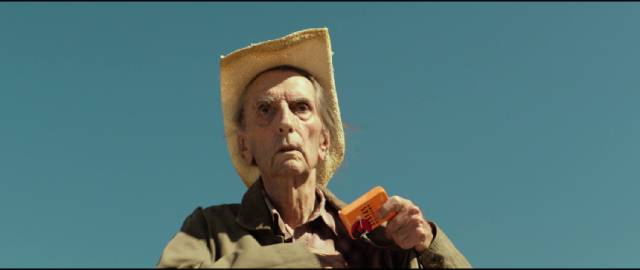
A friend has been urging me for years to watch John Carroll Lynch’s Lucky (2017), but even though the Eureka Blu-ray has been sitting on the shelf for at least three years, I kept putting it off. I’m not sure I can fully articulate the reasons for my reluctance. In part, I’m sure it had something to do with the fact that this was Harry Dean Stanton’s final movie – he died just before it was released – and that he was essentially playing himself in a role written for him by long-time friend Logan Sparks and Drago Sumonja. Part of me was a little afraid of the emotions this was likely to stir up.
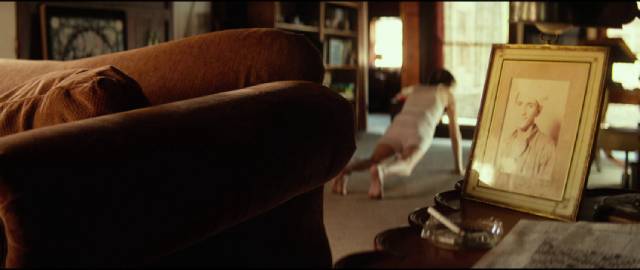
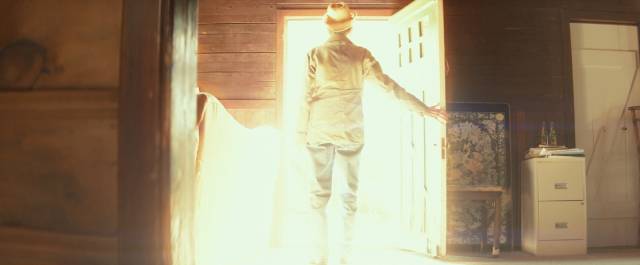
Although I didn’t become consciously aware of Harry Dean until sometime in the ’70s, I’d been seeing him in numerous television series (a lot of westerns) since the early ’60s, so he was a fixture in my viewing experience for almost my entire life. Once I did become aware of him during the ’70s, he was the kind of actor whose presence increased my interest in any particular movie. He was one of the draws which got me into Monte Hellman’s work, which I came to quite a bit later (Ride in the Whirlwind [1966], Two-Lane Blacktop [1971], Cockfighter [1974]), and at the decade’s end he stood out among the ensemble cast of Ridley Scott’s Alien (1979) as a working-class spaceman with a contemptuous disdain for his corrupt employers.
Then came his hugely entertaining lead performance in Alex Cox’s Repo Man (1984), quickly followed by his weary loner in Wim Wenders’ Paris, Texas and his conman preacher in John Binder’s inexplicably forgotten UFOria (both also 1984). He seemed to be everywhere, in small supporting roles which lifted minor movies, in bigger films to which his presence added humour and texture. Then in 1990 he connected with David Lynch, a filmmaker who seemed a perfect fit for his laconic, weary disdain for a world all-too often fatally flawed.
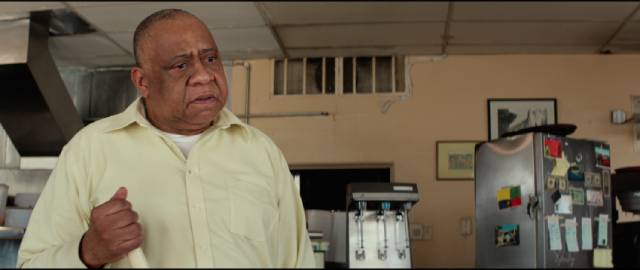
He was the ill-fated private eye Johnnie Farragut in Wild at Heart (1990), the ill-tempered trailer park manager Carl Rodd in Twin Peaks: Fire Walk With Me (1992), a guest in one episode of the short-lived series Hotel Room (1993), the estranged brother who’s the object of Alvin Straight’s gruelling journey in The Straight Story (1999); there he was again in Lynch’s sprawling, surreal masterpiece Inland Empire (2006) before capping it all with a reprise of his Fire Walk With Me character in five episodes of Twin Peaks: The Return (2017). And in between, dozens of other roles – IMDb lists over two-hundred in all.
Which is only to say that Harry Dean Stanton had been a central fixture in my movie-obsessed life and a part of me didn’t want to contemplate his death – but how could that be avoided when watching a movie in which the somewhat autobiographical character was contemplating his own death? And so I kept putting it off. Until the other day when my friend came over specifically to see the movie again herself.
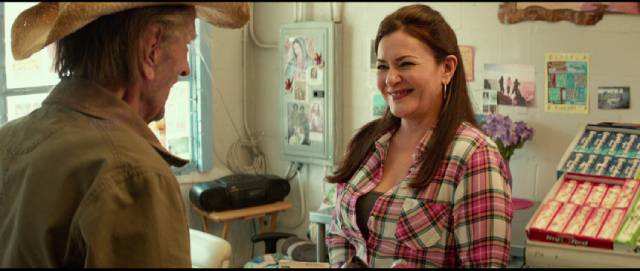
Lucky is a character study with the slightest of narratives – that is, if you’re looking for something built around events which coalesce into a story. Lucky (Stanton) is a 90-year-old man who lives alone in a small house at the edge of a small desert town. He’s a creature of habit, rising every morning, washing, brushing his teeth, drinking a glass of milk, lighting a cigarette which, after a couple of drags, he rests in an ashtray while he does his exercises. Then he walks into town and sits at his usual place in the diner, working on a crossword while drinking coffee, and bantering with the owner Joe (Barry Shabaka Henley) and the waitress Loretta (Yvonne Huff Lee). Although nothing much is happening, the small accumulated details give a structure to his life. Every day, walking away from the diner, a pick-up drives by and honks its horn and Lucky raises his hand in greeting. He pauses to spit an obscenity at someone or something we can’t see (we only learn the identity of the target near the end, after Lucky’s anger has been dissipated); he stops in at a small store run by a Hispanic woman named Bibi (Bertila Damas), where he buys milk and cigarettes.
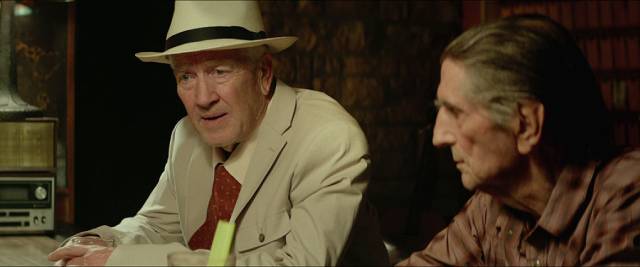
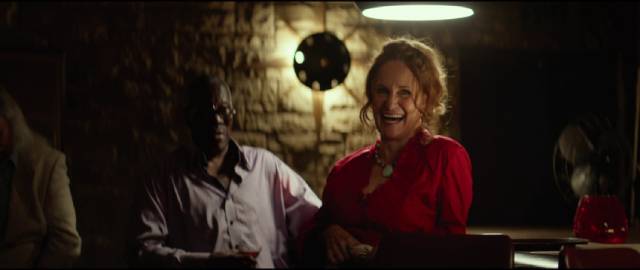
In the evening, he goes to a bar owned by Elaine (Beth Grant) where the banter has an air of ritual repetition. The bartender Vincent (Hugo Armstrong) can complete the sentences of the customers and the owner’s husband Paulie (James Darren) because everyone tells the same stories over and over. Life here is cyclical, the town’s inhabitants in a holding pattern. But on the first evening we see Lucky at the bar, his old friend Howard (David Lynch) is a little distraught – his pet tortoise President Roosevelt has run away. Here we get the first hint of the fragility of connection, the prospect of loss, and without realizing it Lucky’s life is about to be disrupted.
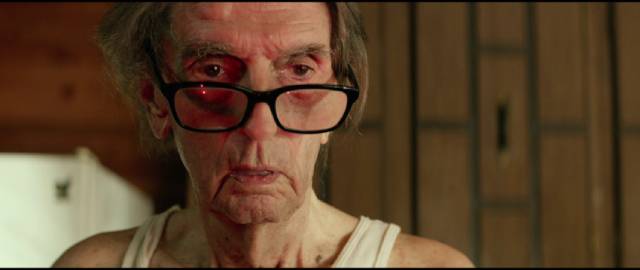
One morning, Lucky finds himself staring at the flashing clock on his coffeemaker, almost in a trance, and he falls over. His doctor (Ed Begley Jr) can’t find any specific cause and tells him that he’s simply getting old. This is a thought Lucky has kept at bay, but now it worms its way into his mind; he’s taken life for granted, shaped it to his liking with his routines, and set aside memories of experiences he’d rather not recall. But now the defences have been breached.
This new awareness seems to send ripples out into the world. Very quickly, everyone in town knows about his fall and wherever he goes, people ask if he’s okay, small signs of concern which violate the carefully constructed pattern of his life. He reacts with irritation and resistance, but the world seems determined not to allow him to retreat back into his former state – at the diner, people are sitting in his usual place at the counter, forcing him to sit in a booth. At the store, Bibi tentatively invites him to her son’s tenth birthday party on Saturday – there’ll be a mariachi band. And at the bar, he waits for Howard to show up, only to discover that he’s already there at the back talking to his lawyer (Ron Livingston) about a will and preparations for his own end-of-life.
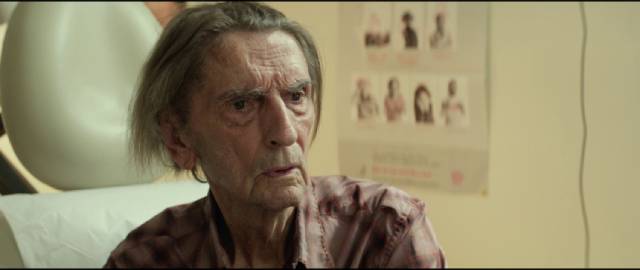
Lucky lashes out, furious at the lawyer and somehow betrayed by Howard’s planning for his own death. He’s losing his grip on his own reality. One morning as he waters the plants in his garden, dressed only in his underwear and cowboy boots, Loretta stops by. She’s concerned about him, which just irritates him, and he goes back inside and gets dressed. Coming out into the living room, he’s startled to find that she’s followed him in and is looking at the old photos on a shelf – photos of Lucky as a child, as a young man in the Navy. He asks if she wants to watch a game show; she asks if he wants to share a joint. They relax, smoking and watching Liberace on television. When she has to get back to work, she gives him a hug and, after a moment of resistance, he reciprocates.
As she goes to the door, he asks if he can tell her a secret, something she mustn’t repeat to anyone. “I’m scared,” he says. “I know,” she replies.
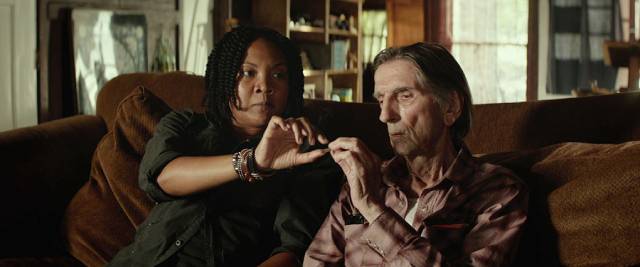
At the diner, he spots a man with a Marine’s cap and they begin talking. Lucky was a cook in the Navy on a ship delivering munitions to fighting units, barely escaping death. The other man (Tom Skerritt, Harry Dean’s co-star in Alien) recounts his harrowing experience seeing Japanese islanders throwing their children and themselves off cliffs because they’d been convinced by propaganda that the Americans would rape and kill them. And one young girl in particular had emerged from her hiding place with a beaming smile; here was someone unafraid … but not because she didn’t believe the propaganda, rather because as a Buddhist she faced her death with a calm acceptance.
On Saturday afternoon, Lucky goes to the birthday party. Bibi introduces him to her mother, Victoria (Ana Mercedes), who’s surprised when he speaks to her in Spanish. Later, after the smashing of the pinata and the blowing out of candles, he stands at the edge of the party and looks almost ready to flee. But in a moment of quiet he begins to sing a Spanish song. His voice is clear and expressive and suddenly it seems that all the emotions he has kept quietly tamped down are being released. Everyone turns to look, initially uncertain, surprised, then the band joins him in the song and by the end the whole family is singing with him.
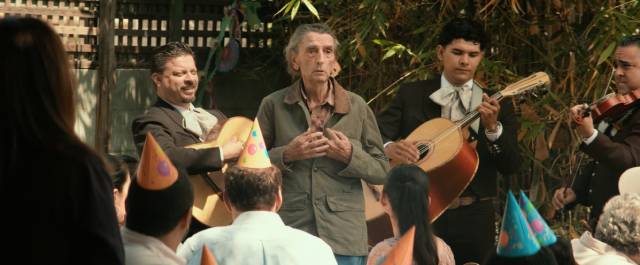
When he arrives at the bar that evening, he’s buoyant and cheerful. Through the encounters of the past few days he has emerged from a state of stasis, has connected with the people around him not through the safe routines he has established over many years, but on a riskier level of emotional vulnerability. And like the little girl the Marine told him about, he has reached a point of acceptance, not denying mortality or trying to hold it at bay, but absorbing it into the moment. He has reconnected with the flow of his own life and opened himself to the people around him.
Lucky is a warm and generous movie in which old age is seen not as something to fear or pity, but rather as the rich culmination of a lifetime’s experience. I can think of only two other movies which have had a similar effect on me – David Lynch’s The Straight Story and Peter Donaldson’s The World’s Fastest Indian (2005), both films made with warmth and generosity which lead to a similar place of acceptance, an embrace of human connection which dissipates a fear of mortality. Unlike so many other movies about growing old, these don’t end in the death of the protagonist. Although we, and the characters themselves, know that death is inevitable, now, here in this moment, life is vital and should be embraced, not negated by its unavoidable end.
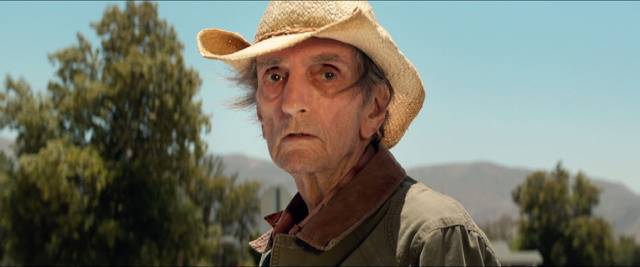
While watching Lucky, I did feel all the emotions I had feared – there was a deep sense of loss accompanying this record of the late days of Harry Dean’s life. But that’s about me, not about him or the movie itself. Beneath the physical fragility on display, he lights the screen with a remarkable, radiant beauty. It’s impossible to separate this image of a calm acceptance which embraces life from the persona of the actor himself. Lucky overflows with a sense of generosity – the generosity of writers Sparks and Sumonja and first-time director John Carroll Lynch, who tailored the film to provide an intimate portrait of Harry Dean himself, and the generosity of Harry Dean in revealing himself without a trace of self-consciousness or artifice. It’s impossible not to feel that we are seeing him exactly as he was (something confirmed by Sophie Huber’s documentary Harry Dean Stanton: Partly Fiction [2012], included on Eureka’s disk, in which the actor seems almost indistinguishable from Lucky) – and that too adds to the sense of loss. Just writing about it is making me tear up again, as I did while watching the movie.
So I have to thank my friend for finally making me watch the film. Lucky is one of the most emotionally rich, deeply moving and finally satisfying movies I’ve watched in a very long time.
Comments